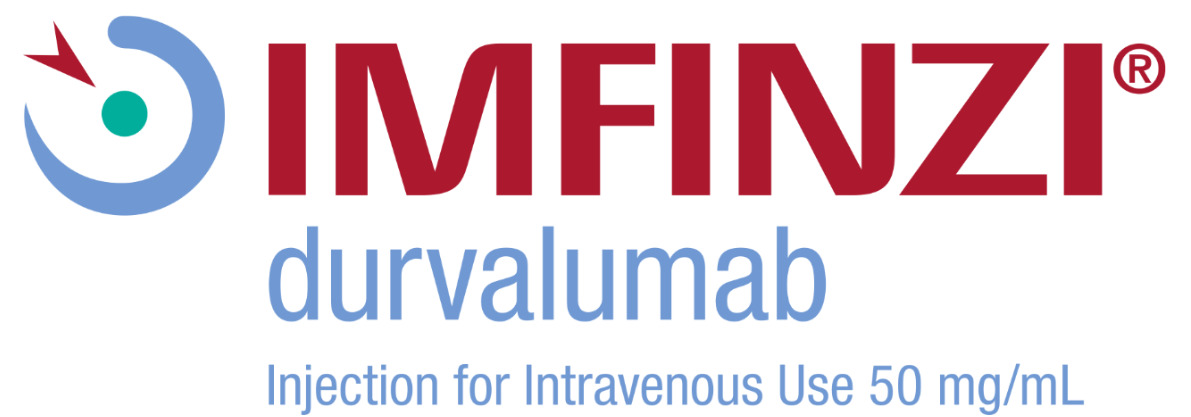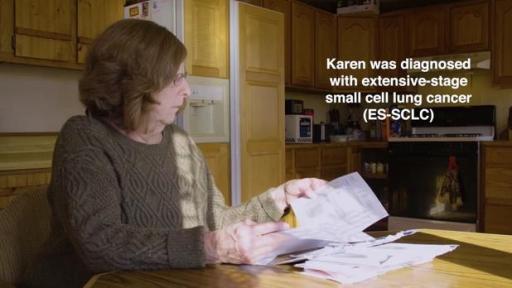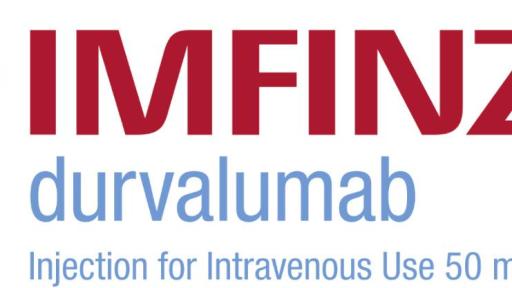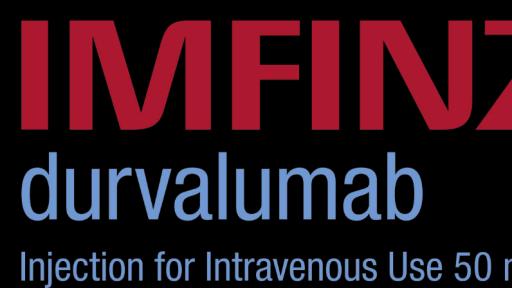IMFINZI® (durvalumab) APPROVED IN THE US TO TREAT EXTENSIVE-STAGE SMALL CELL LUNG CANCER
IMFINZI used with etoposide and a choice of carboplatin or cisplatin chemotherapy reduced the risk of death by 27% compared to chemotherapy alone
(WILMINGTON, Del., March 30, 2020) – AstraZeneca today announced that the US Food and Drug Administration has approved the immunotherapy treatment IMFINZI® (durvalumab), in combination with the chemotherapy medicines etoposide and either carboplatin or cisplatin (platinum-etoposide), as the first treatment given to adults with extensive-stage small cell lung cancer (ES-SCLC).
SCLC is an aggressive, fast-growing form of lung cancer that is typically divided into two stages: limited-stage, when the tumor is localized to one lung or nearby lymph nodes, and extensive-stage disease, when the cancer has spread to both lungs or other more distant parts of the body.1,2 About two-thirds of those newly diagnosed have extensive-stage disease when the cancer is first found.2
This approval was based on positive results from a Phase III clinical trial called CASPIAN in which people taking IMFINZI plus chemotherapy lived significantly longer than people taking chemotherapy alone.
The study showed that people receiving IMFINZI plus chemotherapy had a 27% lower risk of death. The median overall survival was 13.0 months for IMFINZI plus chemotherapy vs 10.3 months for chemotherapy alone. Median is the middle number in a range of numbers. An additional analysis of the study also found that 68% of people taking IMFINZI plus chemotherapy saw their tumors shrink and 58% of people taking chemotherapy alone saw their tumors shrink.
The most common side effects experienced by 20% or more of patients with extensive-stage SCLC taking IMFINZI were nausea, fatigue/asthenia and alopecia.
Dave Fredrickson, Executive Vice President, Oncology Business Unit, said: “The US approval of IMFINZI brings a new medicine to people with extensive-stage small cell lung cancer who are in urgent need of new options.”
Jonathan Goldman, MD, Associate Professor of Hematology & Oncology, UCLA Medical Center, Santa Monica, California and a lead investigator in the Phase III CASPIAN trial, said: “Patients with extensive-stage small cell lung cancer continue to face a poor prognosis, and finding new medicines to improve outcomes in this setting has been a formidable challenge. The CASPIAN trial allows physicians to choose durvalumab in combination with etoposide and either carboplatin or cisplatin, making this an important new initial treatment option for patients.”
Patients in the CASPIAN trial received a 1500 mg dose of IMFINZI in addition to chemotherapy every three weeks for four cycles, followed by IMFINZI by itself every four weeks, for as long as their cancer didn’t worsen.
Important Safety Information
What is the most important information I should know about IMFINZI?
IMFINZI is a medicine that may treat certain types of lung cancer by working with your immune system.
IMFINZI can cause your immune system to attack normal organs and tissues and can affect the way they work. These problems can sometimes become serious or life-threatening and can lead to death.
Call or see your healthcare provider right away if you develop any symptoms of the following problems or if these symptoms get worse:
Lung problems (pneumonitis). Signs and symptoms may include new or worsening cough, shortness of breath, and chest pain.
Liver problems (hepatitis). Signs and symptoms may include yellowing of your skin or the whites of your eyes, severe nausea or vomiting, pain on the right side of your stomach area (abdomen), drowsiness, dark urine (tea colored), bleeding or bruising more easily than normal, and feeling less hungry than usual.
Intestinal problems (colitis). Signs and symptoms may include diarrhea or more bowel movements than usual; stools that are black, tarry, sticky, or have blood or mucus; and severe stomach-area (abdomen) pain or tenderness.
Hormone gland problems (especially the thyroid, adrenals, pituitary, and pancreas). Signs and symptoms that your hormone glands are not working properly may include headaches that will not go away or unusual headaches; extreme tiredness; weight gain or weight loss; dizziness or fainting; feeling more hungry or thirsty than usual; hair loss; feeling cold; constipation; your voice gets deeper; urinating more often than usual; nausea or vomiting; stomach-area (abdomen) pain; and changes in mood or behavior, such as decreased sex drive, irritability, or forgetfulness.
Kidney problems, including nephritis and kidney failure. Signs of kidney problems may include decrease in the amount of urine, blood in your urine, swelling of your ankles, and loss of appetite.
Skin problems. Signs may include rash, itching, and skin blistering.
Problems in other organs. Signs and symptoms may include neck stiffness; headache; confusion; fever; chest pain, shortness of breath, or irregular heartbeat (myocarditis); changes in mood or behavior; low red blood cells (anemia); excessive bleeding or bruising; muscle weakness or muscle pain; blurry vision, double vision, or other vision problems; and eye pain or redness.
Severe infections. Signs and symptoms may include fever, cough, frequent urination, pain when urinating, and flu-like symptoms.
Severe infusion reactions. Signs and symptoms may include chills or shaking, itching or rash, flushing, shortness of breath or wheezing, dizziness, fever, feeling like passing out, back or neck pain, and facial swelling.
Getting medical treatment right away may help keep these problems from becoming more serious. Your healthcare provider will check you for these problems during your treatment with IMFINZI. Your healthcare provider may treat you with corticosteroid or hormone replacement medicines. Your healthcare provider may delay or completely stop treatment with IMFINZI if you have severe side effects.
Before you receive IMFINZI, tell your healthcare provider about all of your medical conditions, including if you have immune system problems such as Crohn’s disease, ulcerative colitis, or lupus; have had an organ transplant; have lung or breathing problems; have liver problems; or are being treated for an infection.
If you are pregnant or plan to become pregnant, tell your healthcare provider. IMFINZI can harm your unborn baby. If you are able to become pregnant, you should use an effective method of birth control during your treatment and for at least 3 months after the last dose of IMFINZI. Talk to your healthcare provider about which birth control methods to use. Tell your healthcare provider right away if you become pregnant during treatment with IMFINZI.
If you are breastfeeding or plan to breastfeed, tell your healthcare provider. It is not known if IMFINZI passes into breast milk. Do not breastfeed during treatment with IMFINZI and for at least 3 months after the last dose of IMFINZI.
Tell your healthcare provider about all the medicines you take. This includes prescription and over-the-counter medicines, vitamins, and herbal supplements.
What are the possible side effects of IMFINZI?
IMFINZI can cause serious side effects (see above).
The most common side effects in people with non-small cell lung cancer (NSCLC) include cough, feeling tired, inflammation in the lungs (pneumonitis), upper respiratory tract infections, shortness of breath, and rash.
The most common side effects of IMFINZI when used with other anticancer medicines with SCLC include: nausea, hair loss, and feeling tired or weak.
Tell your doctor if you have any side effect that bothers you or that does not go away. These are not all the possible side effects of IMFINZI. Ask your healthcare provider or pharmacist for more information.
Call your healthcare provider for medical advice about side effects. You may report side effects to FDA at 1-800-FDA-1088.
You may report side effects related to AstraZeneca products by clicking here.
Please see complete Prescribing Information, including Patient
Information (Medication Guide).
What is IMFINZI?
IMFINZI is a prescription medicine used to treat adults with a type of lung cancer called non-small cell lung cancer (NSCLC). IMFINZI may be used when your NSCLC has not spread outside your chest, cannot be removed by surgery, and has responded or stabilized with initial treatment with chemotherapy that contains platinum, given at the same time as radiation therapy.
IMFINZI is a prescription medicine used to treat adults with a type of lung cancer called small cell lung cancer (SCLC). IMFINZI may be used with the chemotherapy medicines etoposide and carboplatin or cisplatin as your first treatment when your SCLC has spread within your lungs or to other parts of the body (extensive-stage small cell lung cancer, or ES-SCLC).
It is not known if IMFINZI is safe and effective in children.
About AstraZeneca Support Programs
AstraZeneca strives to ensure that appropriate patients and their oncologists have access to IMFINZI and relevant support resources. These include educational resources, an Oncology Nurse Educator program and affordability and reimbursement programs, such as Access 360™.
Additionally, AstraZeneca has launched Lighthouse, a program that provides support to patients during any immune-mediated adverse events they may encounter during treatment, through medically trained Lighthouse Advocates. The program aims to make patients’ treatment experience as comfortable as possible. Find out more about Lighthouse at LighthouseProgram.com or call 1-855-LHOUSE1(1-855-546-8731).
References
- NIH Medline Plus. Lung Cancer-Small Cell. Available at https://medlineplus.gov/ency/article/000122.htm. Accessed March 2020.
- ASCO. Lung Cancer—Stages. Available at https://www.cancer.net/cancer-types/lung-cancer-small-cell/stages. Accessed March 2020
Media Contact:
US Media Line
+1 302 885 2677
US-39129 Last Updated 3/20






